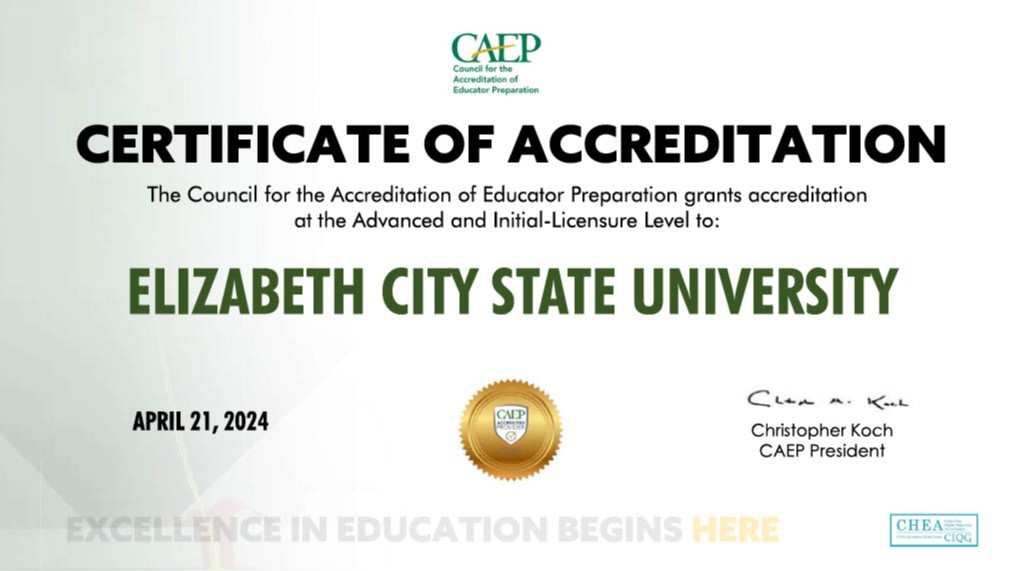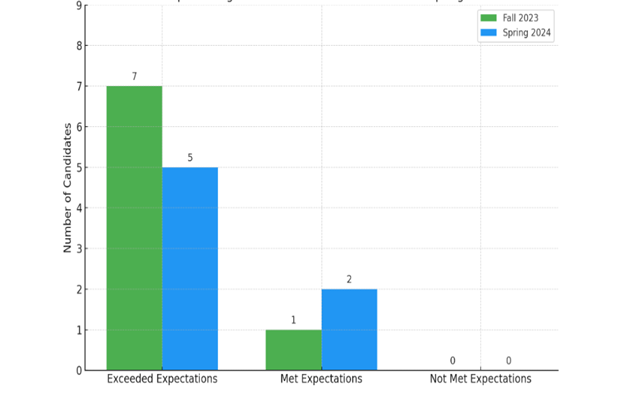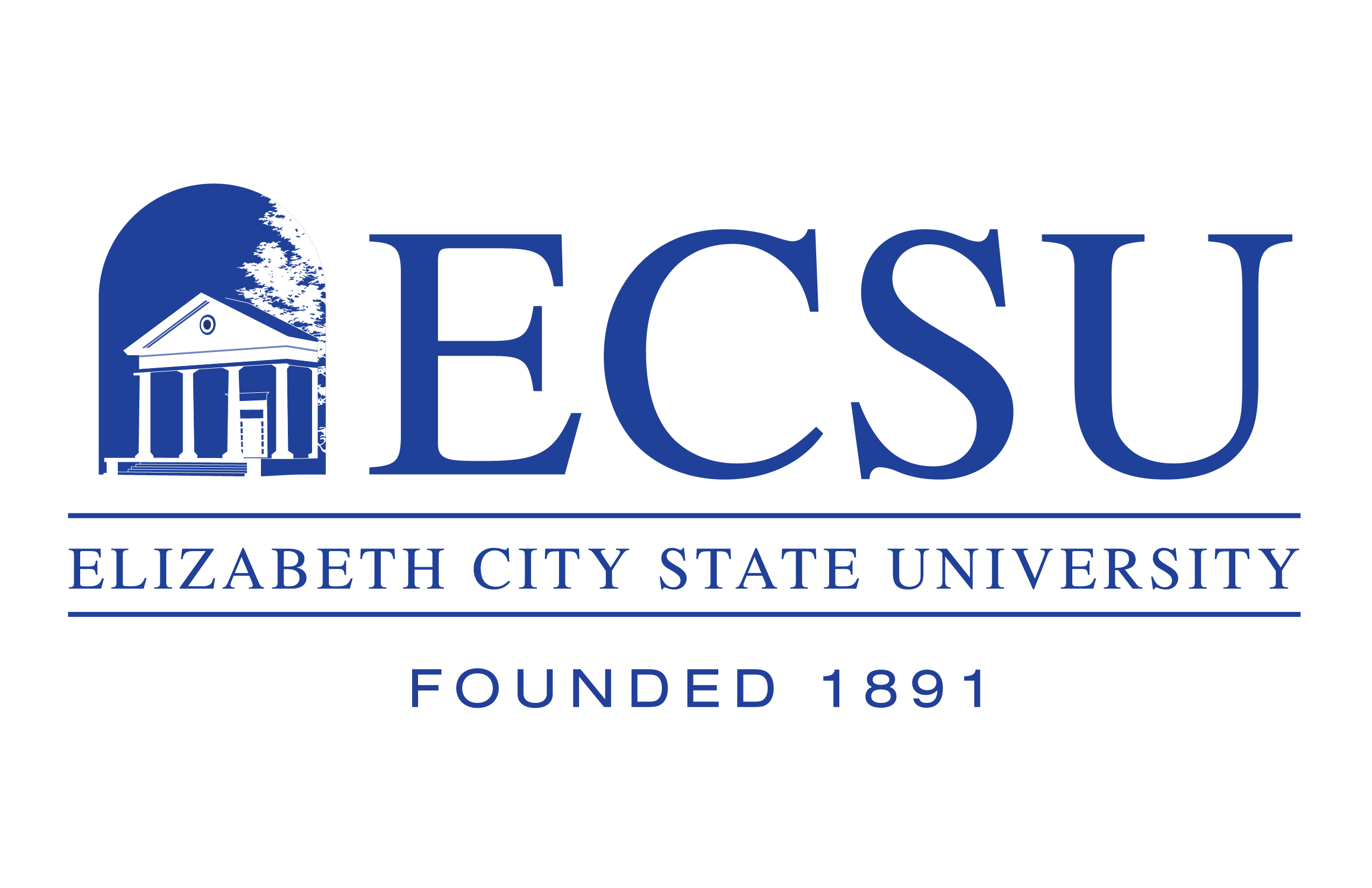Education



CAEP Accredited April 2024

education DEPARTMENT OVERVIEW
The Department of Education offers undergraduate degrees through the Educator Preparation Program (EPP) and graduate degrees. Through the EPP, we recruit, retain, and prepare students for North Carolina teaching licensure. Our students are guided by faculty and assessed throughout the licensing process to ensure excellence and compliance with departmental, university, state, and national standards.
- Birth through Kindergarten (B-K)
- Elementary Education (K-6)
- Special Education (K-12)
- Master of Education in Elementary Education
- Master of School Administration
Council for the Accreditation of Educator Preparation (CAEP Approved Programs)
|
Program Name |
Licensure Level |
Degree |
|
Biology |
Initial-Licensure Level |
Masters |
|
Birth through Kindergarten |
Initial-Licensure Level |
Baccalaureate |
|
Comprehensive Science |
Initial-Licensure Level |
Baccalaureate |
|
Elementary |
Initial-Licensure Level |
Masters |
|
Elementary Education |
Initial-Licensure Level |
Baccalaureate |
|
English |
Initial-Licensure Level |
Baccalaureate |
|
Mathematics |
Initial-Licensure Level |
Baccalaureate |
|
Music |
Initial-Licensure Level |
Baccalaureate |
|
Physical Education |
Initial-Licensure Level |
Baccalaureate |
|
School Administration (School Leadership) |
Advanced Level |
Masters |
|
Social Studies |
Initial-Licensure Level |
Baccalaureate |
|
Special Education: General Curriculum |
Initial-Licensure Level |
Baccalaureate |
View the undergraduate and graduate programs:
The Department of Education is fully accredited by the Council of Accreditation of Educator Preparation (CAEP) for all undergraduate programs.
Designed to finalize coursework necessary for completion of a teaching license, this program is designed for individuals with a bachelor's degree. The program may consist of subject area coursework, pedagogy coursework for the license sought and student teaching.
-
Bachelor degree;
-
Completed 24 hours of coursework in the requested licensure area or passed the North Carolina State Board of Education (NCSBE) required content area examination(s) for the requested licensure area;
-
Earned a grade point average of 2.8 on a four-point scale for formal admission to approved North Carolina EPPs; and
-
Meets all requirements established by the NCSBE, including completing pre service requirements prior to teaching.
More About Our Department
1. Meet the minimum admissions requirements
If you graduated high school after 1990, you must have completed the following high school courses and meet the academic performance thresholds below.
- 4 units of English
- 4 units of Mathematics
- Algebra I and II, geometry, and one unit beyond Algebra II,
- Algebra I and II, and two units beyond Algebra II, or
- Integrated Math I, II, and III, and one unit beyond Integrated Math III.
- 3 units of Science (Biological, Physical, and Laboratory Courses)
- 2 units of Social Studies
- 2 units of Foreign Language
Minimum GPA: 2.5 (weighted)
Note: The University of North Carolina System will not require SAT or ACT scores for undergraduate admissions through fall 2024.
Graduates of Cooperative Innovative High Schools in North Carolina
If you graduated from a Cooperative Innovative (or Early College) High School in North Carolina with an Associate’s degree, you are likely eligible to be admitted either as a freshman or a transfer student. Please consult the resources below to determine your eligibility. If you have any questions, please contact the Admissions Office with any questions.
List of Cooperative Innovative High Schools
Transfer admissions requirements
2. Submit an online application
Apply online and submit a $30 non-refundable application fee.
3. Send transcripts and test scores
Have official copies of all high school transcripts sent to:
Elizabeth City State University
Office of Admissions and Recruitment
120 Marion D. Thorpe Sr. Administration Building
1704 Weeksville Rd.
Campus Box 901
Elizabeth City, NC 27909
Test scores can be sent using the following school codes:
ACT: 3095
College Board/SAT: 5629
4. Create an Admissions Portal account
We will send you an email with a verification link to create your Viking Admissions Portal account. You can use this to follow the status of your application and, if accepted, confirm your enrollment at ECSU.
According to the criteria established by the Department of Public Instruction and the Department of Education, students must complete the following for program eligibility
- meet regularly with assigned advisor;
- complete an application to the Educator Preparation Program;
- complete a criminal background check with certified background.com and have a satisfactory record;
- completed 15 hours of classroom field experience
- undergraduate GPA of at least 2.80;
- complete interview process;
- acceptable writing sample; and
- *satisfy Praxis Core
*Licensure Only candidates are not required to take Praxis Core. Each student who applies for admission to the Educator Preparation Program will be given written notification regarding admission or denial. A student is not considered admitted to the Educator Preparation Program until such notification is provided.
Students must apply for North Carolina teaching license or renewal using the North Carolina online licensing system. Students must submit the following:
- An official transcript (including degree awarded date)
- Certification of Teacher Capacity Form
- Praxis II or NCTEL (NCTEL-Elementary & Special Education programs only)
TeachNC
TeachNC, in partnership with the North Carolina Department of Public Instruction (NCDPI), BEST NC and TEACH, was created to assist anyone considering teaching in North Carolina.
AAHPERD, American Alliance for Health, Physical Education, Recreation and Dance
AASA, American Association of School Administrators
AASL, American Association of School Librarians
ACEI, Association for Childhood Education International
ACTFL, American Council on the Teaching of Foreign Languages
AECT, Association for Educational Communications and Technology
AERA, American Educational Research Association
AESA, Association of Educational Service Agencies
AFT, American Federation of Teachers
ALAS, Association of Latino Administrators and Superintendents
AMLE, Association for Middle Level Education
ASBO, Association of School Business Officers International
ASCD, Learn, Teach, Lead
ASCA, American School Counselor Association
ASIS International, Advancing Security Worldwide
CEC, Council for Exceptional Children
CEFPI, Council of Educational Facilities Planners International
CoSN, Council for School Networking
FETC, Florida Educational Technology Conference
InfoComm, Information Communications Marketplace
IRA, International Reading Association
ISTE, International Society for Technology in Education
NAEA, National Art Education Association
NAESP, National Association of Elementary School Principals
NAEYC, National Association for the Education of Young Children
NAfME, National Association for Music Education
NAGC, National Association for Gifted Children
NASSP, National Association of Secondary School Principals
NBEA, National Business Education Association
NCSS, National Council for the Social Studies
NCTE, National Council of Teachers of English
NCTM, National Council of Teachers of Mathematics
NEA, National Education Association
NSBA, National School Boards Association
NSTA, National Science Teachers Association
PTA, National Parent Teachers Association
SETDA, State Educational Technology Directors Association
TCEA, Texas Computer Education Association
USDLA, United States Distance Learning AssociationCAEP Accountability Measures
Measure 1 (Initial): Completer effectiveness. (R4.1) Year 2023-2024
- Data must address: (a) completer impact in contributing to P-12 student-learning growth AND (b) completer effectiveness in applying professional knowledge, skills, and dispositions.

Measure 2 (Initial and Advanced): Satisfaction of employers and stakeholder involvement. (R4.2, R5.3, RA4.1)
- Data provided should be collected on employers’ satisfaction with program completers.
Initial
Satisfaction of Employers
ECSU is 98% in Employer Satisfaction. ECSU ties with one of only two in the UNC System at a 98% rating.

Advanced
MSA Employer Satisfaction Surveys Fall 2023 and Spring 2024

Measure 3 (Initial and Advanced): Candidate competency at completion. (R3.3)
- Data provided should relate to measures the EPP is using to determine if candidates are meeting program expectations and ready to be recommended for licensure. (E.g.: EPP’s Title II report, data that reflect the ability of EPP candidates to meet licensing and state requirements or other measures the EPP uses to determine candidate competency at completion.)
Initial
Licensure Exam Data Fall 2023 and Spring 2024

Advanced
MSA Student Oral Presentations Fall 2023 and Spring 2024

Measure 4 (Initial and Advanced): Ability of completers to be hired (in positions for which they have prepared).
- Data provided may come from various sources, including state or EPP collected data related to completers' employment in teaching positions for which they were prepared.
Initial
The chart below indicates NC Employment only; however, one hundred percent (100%) of ECSUs EPP Program are hired within the first year of employment.

Advanced
MSA Students Hired in Leadership Positions Fall 2023 and Spring 2024

Dr. Shelia Williams
Associate Professor, Education
243 Gilchrist Complex
Campus Box 856
shwilliams@ecsu.edu
We're here to help
We’re here to support you throughout your time at ECSU–starting now. For more info on the admissions process, reach out to us directly.
